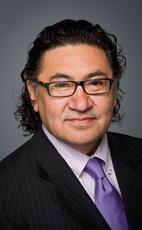Mr. Speaker, meegwetch. Today I am proud to rise again to defend Bill C-641, an act to ensure that the laws of Canada respect the UN Declaration on the Rights of Indigenous Peoples. I would first like to thank the other opposition parties for their express support of this bill.
As a jurist, I have deep respect for integrity and the rule of law. Last month, I spoke here about the legal reasons why the Canadian government must pass this bill. However, the federal government once again demonstrated its contempt for the rule of law.
We have long passed the time in history when it was thought acceptable for the Canadian government to make paternalistic decisions on behalf of indigenous peoples. Multiple international and national legal decisions reflect the shift society is making back towards the original spirit, intent and letter of the first treaties between our nations.
It is time for this Chamber to move forward honourably by respecting the Constitution and its promises.
In his response to my bill, the parliamentary secretary followed the well-established pattern used by federal government spokespersons when they address the rights of indigenous peoples. His speaking notes were filled with inaccuracies, showed a misunderstanding of the law and highlighted the government's ignorance of the will of indigenous peoples and, may I add, of all Canadians.
On April 13, a detailed legal response to the parliamentary secretary's comments was published by a coalition of organizations. It is a long list, and I will spare the House. However, I would like to take this opportunity to raise some of their points in the defence of my bill.
Contrary to the member's understanding, implementation of the declaration is a political, moral and, yes, legal imperative, without qualification. This was confirmed by a former special rapporteur, James Anaya. Since 2006, the Government of Canada has not fundamentally changed its adverse strategies and positions in relation to indigenous peoples' rights. Consistent with its international and constitutional obligations, the government has a crucial opportunity here to embark together with indigenous peoples on a collaborative and principled process supporting and adopting Bill C-641.
Yet, and this is troubling, the Canadian government applies a different and lesser standard to democracy, human rights, security and the rule of law when addressing the rights of indigenous peoples. That is shameful. This double standard is highly discriminatory.
In opposing Bill C-641, the federal government claims it is upholding core values and principles, and defending Canada's Constitution in the interests of all Canadians. It also insists that it is devoted to safeguarding aboriginal rights. Such claims do not withstand careful scrutiny.
In reality, the government willfully ignores the rule of law. This includes crucial rulings of the Supreme Court of Canada, which affirms indigenous peoples' right to give or withhold consent.
The government appears to view the declaration as a threat to the government's ongoing colonial domination. However, as underlined by a former special rapporteur on the rights indigenous peoples, “...no country has ever been diminished by supporting an international human rights instrument.”
I am happy to say that my Bill C-641, if fairly implemented in close collaboration with indigenous peoples, could mark a new beginning. Canada could be tremendously strengthened for the benefit of all.
Again, as a country, we need to be consistent. We need to be consistent in our application of such principles and values as democracy, human rights, the rule of law and security. We cannot insist on upholding these principles in the face of terrorism while not doing so in the face of fundamental rights of indigenous people. There is a name for that, discrimination, and that is prohibited under international law and prohibited under our Constitution.
I urge all members of this House to support Bill C-641.

